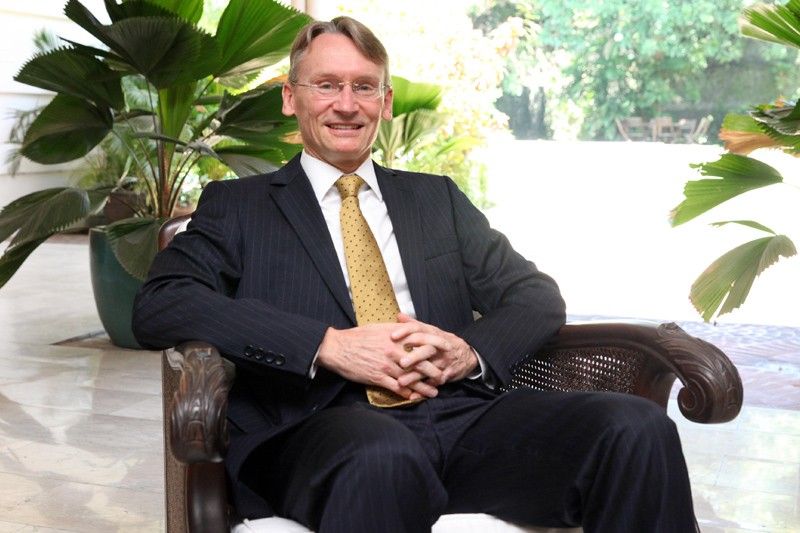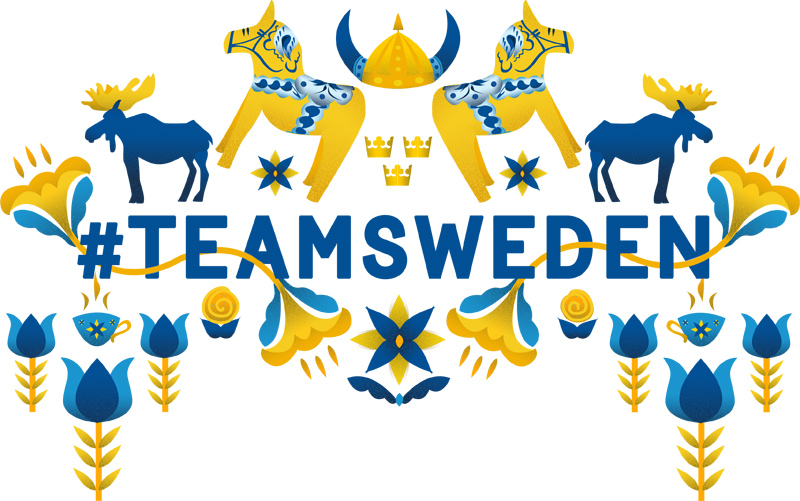#TeamSweden: The Swedish art of collaboration

Almost three years after the reopening of the Embassy of Sweden in Manila, Ambassador Harald Fries is enthusiastic to speak about the healthily growing relationship between Sweden and the Philippines. This flourishing bilateral relationship built on collaboration is the highlight of the Swedish National Day celebration today, June 6.
With the core tasks of enhancing trade, updating Sweden’s image, and increasing people-to-people exchange, he sees a vibrant future between the two countries.
Fries has a particularly long history with the Philippines. His affinity to the country dates back to more than 30 years when he first met his would-be Filipina wife in Sweden. He was later appointed a junior diplomat in the early ‘90s in the embassy in Manila.
“I can compare with how it was at that time. Then, we only had large Swedish global companies here, but now we also have many small and medium Swedish companies that have established presence in the Philippines. That is a very healthy, positive change because it shows that not only the big players who can establish everywhere in the world have confidence in doing business here, but also smaller companies that don’t have as much resources,” the ambassador shares in an interview in his Swedish-Filipino-inspired home.
“It was clear when we reopened the embassy in 2016 that interest among Swedish companies in finding business partners here has increased significantly in recent years. The large Philippine population with a growing middle class, good economic growth, and business-friendly reforms are key factors that attract Swedish companies.”
In connection with the reopening of the embassy in 2016, the biggest-ever Swedish business delegation came to the Philippines.
The Embassy of Sweden was closed from 2008 to 2016, but Team Sweden never left the country. From IT and BPO to transportation and fashion industries, an increasing number of Swedish companies continued doing good business here. These include Scania, Atlas Copco, Swedish Match, Ericsson, Electrolux, Volvo Cars, Buses and Trucks, SKF and Transcom. Recently global brand names such as H&M, Saab, Epiroc, and IKEA have entered the Philippine market.
“Our Swedish businesses in the Philippines represent the core Swedish values of innovation and sustainability. They are all members of Team Sweden and they help us in our promotions work,” Fries adds.
To further enhance trade in the Philippines, Business Sweden, a partly government-funded agency tasked to help Swedish companies to do business abroad, opened up an office in Bonifacio Global City in 2017.
“Another positive development is that the Philippine Chamber of Commerce and Industry has established a Philippine-Sweden Business Council a year ago, with the mission to connect Philippine companies with Swedish companies. That is yet another sign of our increasing business ties, and this one is from the Philippines’ side,” Fries says.
“I hope you sense that we are very happy to be back in the Philippines with the embassy. Now the Swedish government would very much welcome a decision by the Philippine government to reopen its embassy in Stockholm. That would significantly contribute to further strengthen our bilateral relationship, not least through the promotion of Philippine business in Sweden. I am hopeful that this will happen during my time here,” the ambassador furthers.
On youth and shared advocacies
One factor boosting the European country’s reintroduction to Filipinos—and vice versa—is the young generation’s global mindset. For one, the young ones are eager to spend some time in Sweden to go for graduate studies or exchange programs.
Many of the Swedish companies that have set up business here are in the IT sector, hiring well-educated young Filipinos, many with strong engineering background, high proficiency in English and a high level of ambition. In the same way, quite a few young Swedes have chosen to work in the Philippines to take advantage of the start-up scene here.
The ambassador notes that the Filipino youth, to a large extent, share core values with Swedes: human rights, gender equality, freedom of speech, environmental protection, and fighting climate change.
“These are areas where my government is very active globally. And we like to advocate these matters also here in the Philippines. I appreciate that it’s easy to find partners in advocating our priority concerns. The embassy is often organizing events together with civil society organizations, private companies, and government agencies. The civil society in the Philippines is very vibrant,” he expresses.
For instance, the embassy and Business Sweden is working with the Philippine government in developing New Clark City, which Fries describes as “a fantastic possibility of building a new city from scratch and making it right from the beginning.” Last year, the embassy together with Business Sweden hosted the “Philippines-Sweden Smart Cities Collaboration” in Clark, where Swedish companies presented their innovative and sustainable solutions.
“I think the most important contribution we can do is to introduce Swedish know-how and technology to the Philippines. In Sweden, we have worked hard for several decades to take care of our environment and reduce climate change,” says Fries.
“So, Swedish companies have developed innovative technologies to make their products and systems sustainable both in terms of minimizing the negative effect on the environment and offering long-term, high-quality solutions.”
99.5% of all household waste in Sweden get either recycled or transformed into energy. Only half a percent go to the landfill or used as materials in building roads.
“The Philippines has a long way to reach 99.5% of recycling waste, but we can offer the know-how and technology to make progress in that area,” says Fries.
H&M, a Swedish fashion brand, is also spreading its sustainability efforts across its stores in the country by offering boxes where mall-goers can donate their old clothes—including unbranded clothes—in exchange for 15% discount on their next H&M purchase.
H&M has also partnered with the embassy to launch an exhibit called Fashion Revolution: The Future of Textiles to showcase how the fashion industry can become more environment-friendly.
On a similar note, the embassy has delved into #RespetoNaman, a campaign against gender-based violence, with an exhibit titled Don’t Tell Me How to Dress, which features the clothes that women and girls wore when they were sexually abused.
What the team thought would just be a week-long campaign in November last year is now a one-year campaign, touring around malls and universities, in and outside Metro Manila, in partnership with the Office of the Vice President, UN Women and Spark Philippines.
#TeamSweden: Celebrating the National Day of Sweden

It wasn’t until 1983 that Sweden had an official national day and not until 2005 that it became a non-working holiday. Now, Swedes are getting used to commemorating their national day—a day off from work, a day to celebrate that they are Swedes and be happy about their country.
“We don’t really have strong national day traditions. We have other days like Walpurgis Night and Midsummer Eve where we have older traditions, and we have specific things to do, specific food and activities and so on. The national day celebration is still quite new,” shares Fries.
“Here in the Philippines, the embassy wants to use the national day to promote Sweden and to update the image of Sweden as an innovative and progressive country—and we like to do it with our Swedish private sector.”
Since the embassy came back to the Philippines, it has partnered with the Swedish private sector in several projects and events. That is the basis for this year’s theme: #TeamSweden: A celebration of Swedish collaboration and values.
Today, the Embassy of Sweden, Business Sweden, the Philippine-Sweden Business Council and the Swedish companies in the Philippines gather with their Philippine partners to celebrate the Swedish National Day.
A number of companies who are proud members of Team Sweden have partnered with the embassy for the celebration.
Among them are Scania, which is known for its sustainable road transport solutions and services; Epiroc, a trusted name in the global mining and civil industry; Transcom, the biggest Swedish employer in the Philippines and a leading BPO company that uses Virtual Reality Training to its more than 12,000 employees; Volvo Cars, known to be the manufacturer of the world’s safest cars; Volvo Bus, a frontrunner in developing sustainable buses and shaping the future of transportation in the Philippines; and Atlas Copco, a supplier of industrial tools and equipment in the Philippines.
In addition, the embassy is delighted to partner with Banco de Oro, a strong advocate of climate-smart projects and sustainability.
“We celebrate with Swedish food and music. The Swedish companies will showcase their innovative and sustainable products and solutions. We will introduce Floorball, a sport that is spreading like wildfire around the world. The fundamental idea of our celebration is to emphasize the #TeamSweden spirit,” Ambassador Fries concludes.




















